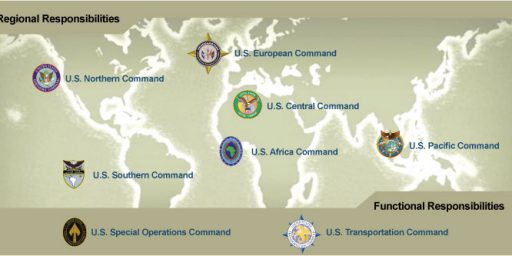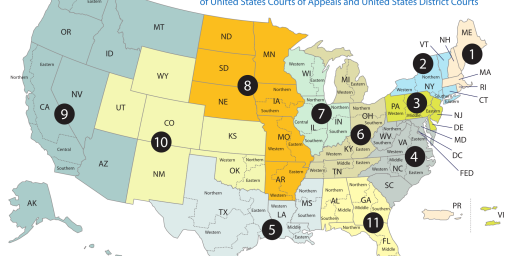Bad Facts Don’t Always Make Bad Law
The Fourth Circuit panel’s 2-1 decision in the al-Marri case today has resulted in a predictable round of triumphalism among the Administration’s opponents. I am here to argue that, even though I agree with the result, that triumphalism is inapposite. The case was not, as al-Marri’s lawyer (from whom the hyperbole is at least understandable) would have it, “landmark victory for the rule of law and a defeat for unchecked executive power.”
Bad facts make bad law — and people credibly accused of being al-Qaida sleeper agents have the potential to make wretched law. All the more reason the Administration should never have pre-empted his criminal trial to get their hands on him when they did. Al-Marri was indicted on several criminal charges, for which he could have been tried and imprisoned if convicted. The indictments were dismissed at the Adminstration’s request so that they could take this ‘enemy combatant’ route instead. Even without the benefit of hindsight, this was a very poor choice.
In truth, the question presented is much narrower than most of the commentary I’ve seen would have it. The dissenting judge narrows down the real dispute quite well. The case hinges in large part on whether or not al-Marri’s detention falls within Hamdi (in which the SupCt affirmed the detention of Bin Laden’s driver, an American citizen). The majority finds he does not because (to reduce a lot of complexity to an overly simple phrase) Hamdi was captured in a theater of war and al-Marri was not. Judge Hudson thinks that that definition of ‘enemy combatant’ is too narrow:
While al-Marri was not captured while armed in a formal theater of war, the evidence would certainly support the conclusion that he was actively supporting forces hostile to the United States — and that the forces he was supporting were actively engaged in armed conflict against the United States.
Judge Hudson points out that in Padilla “a panel of this Court unanimously rejected the argument that the locus of capture was relevant to the President’s authority to detain an enemy combatant.” He believes, therefore, that the same rules as applied to bin Laden’s driver should apply to “surreptitious al Qaeda agents operating within the continental United States.” That’s not a frivolous argument, even if I myself agree that, when combined with the very different circumstances of capture, the legal residency issue over-rides it on general principle.
It will probably surprise many, but one of the panel’s best arguments against the Government’s position is that indefinite detention of al-Marri as an enemy combatant is prohibited by the PATRIOT ACT. One thing everyone seems to have wrong is the oft-repeated contention that this was a major Constitutional decision. The panel expressly sidestepped the Constitutional question as to whether or not the Military Commissions Act’s habeus provisions are Constitutional as applied to resident aliens (rightly so, under judicial canon) by finding that al-Marri’s detention met only one, but not both, of the two requirements in that portion of the MCA. They also found that, while the Fourth Circuit did indeed interpret the AUMF to include the power to detain enemy combatants (that precedent is still good law; the case was mooted before the SupCt could rule on the matter), that power is a general, implied one. Since specific provisions in the PATRIOT ACT relating to “terrorist aliens” conflict with the broader, unspecified AUMF power as they relate to the specific facts of this case, the panel (quite reasonably) applied the specific rather than the general.
In short, this was a statutory interpretation decision, not a Constitutional one. The fact that I (and many others) would still have agreed with it had it been based on the Due Process Clause rather than interpretation of conflicting statutes doesn’t change that.
Assuming the panel’s decision survives a request to be reheard en banc, what the SupCt will do is actually an open question. The Supremes expressly charged the lower courts with exploring the boundaries of the Presidential powers at issue here in Hamdan. They might, therefore, simply deny certiorari to see what the other circuits do with similar cases. Or they might disagree with the panel’s one point of unanimity — that they had jurisdiction to hear the case — and vacate it on jurisdictional grounds. But if I had to guess, I’d say that they’ll agree with the Fourth Circuit that the two-prong test in the MCA wasn’t met in full and avoid, as is their wont, the Constitutional question until such time as it’s presented directly (which may be never; the news articles seem to suggest that al-Marri’s status is unique).





Yes, a very important point. The court repeatedly cited statute and said the detention was not authorized by Congress, seemingly implying that Congress could authorize that sort of detention.
One could read it that way. But it wouldn’t do to make too much of that aspect, either. Courts don’t like deciding questions on Constitutional grounds if they can be decided on ‘lower level’ grounds instead.
This panel was able to avoid the Constitutional question because it could use statutes instead. That isn’t to say that they’d have reached a different result if the statutes had been different. As I read the tone of the opinion, I’m pretty sure they’d have found a way to strike down a statute authorizing such a detention.